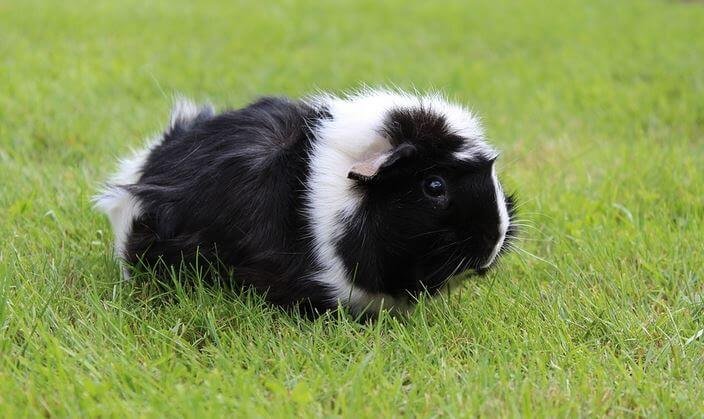When a guinea pig is dead or in shock, one thing is evident; it lies motionless and unresponsive on the cage floor. In this case, the animal may need quick medical attention. Seeing your guinea pig in such a state may get you confused and the first question you’ll ask is, “Is my guinea pig dead or in shock?”
Your guinea pig is dead if its muscles are stiff (rigor mortis) and the eyes are not shiny or are matte-looking. On the other hand, a guinea pig in shock breathes fast, is warm to the touch, and has a high pulse rate and muscle spasms.
In this article, I’ll discuss how to differentiate between a dead guinea pig and one in shock. Either way, you should act fast to determine which state your guinea pig is in. You’ll also know how to help a dying guinea pig to transition smoothly into the next life. Let’s get started!
The Difference Between a Dead Guinea Pig and One in Shock

Often, pet parents remain confused when they see their guinea pig collapse on the floor. Usually, they don’t know if the animal is dead or in shock. This explains why the question, “Is my guinea pig dead or in shock?” pops up frequently.
Fortunately, I’ll discuss the signs to look out for a dead guinea pig and one in shock.
How to Know When Your Guinea Pig Is Dead
1. Check the Guinea Pig’s Breathing
If your piggy is not breathing, it’s probably dead already.
You can check if your guinea pig is breathing by placing your finger near its nostrils. You should feel air going in and coming out of the nostrils. If that’s not the case, the guinea pig is dead.
Moreover, check the abdomen’s movement. If you cannot see its abdomen moving, the piggy is likely dead.
2. Eye Condition
You should check the eye to know if the guinea pig is dead.
Usually, a dead guinea pig will have dull or matte-looking eyes.
When dead, the eyes’ pupil doesn’t respond to a stream of light. It remains enlarged to confirm your piggy is dead.
3. Lack of Movement

A dead guinea pig can’t move. Not even its muscles will show movement when touched. This completely motionless and unresponsive state is a solid indication of a dead guinea pig.
Find Out: Do Guinea Pigs Love Their Owners? 6 Signs Your Guinea Pig Loves You
Symptoms of a Guinea Pig in Shock
The following are the symptoms of a guinea pig in shock:
1. Muscle Movement
A shocked guinea pig may also have problems with making movements. However, you’ll notice small muscle movements, especially in response to a soft touch or handling.
If that’s the case, rush the guinea pig to the vet for treatment. The vet will provide emergency medication to help restore the piggy’s health and save its life in the long run.
2. Increased Pulse Rate
You can use the heartbeat rate to determine if a guinea pig is in shock. The typical pulse rate in such a piggy is very high and sometimes irregular.
You can check the pulse rate by pressing your finger gently on the thick part of the guinea pig’s hind limb.
A guinea pig pulse rate shoule be between 200 to 250 heartbeats per minute.
3. Elevated Breathing
A guinea pig in shock will have an increased breathing rhythm. When the animal is not attended to in time, the breathing becomes slower, a situation that can be fatal.
You can observe your guinea pig’s breathing in the following ways:
- Place your finger over the guinea pig’s nostrils to check breathing. Be sure not to obstruct the animal.
- Observe the abdomen’s movement to check for up and down motion.
The guinea pig is already dead if you realize it’s not breathing.
4. Warm to the Touch
A guinea pig that collapsed because of shock has a warm body. This is because the body’s organs are still functioning.
The piggy will definitely be dead when the body feels cold to the touch.
How Long Can Guinea Pig Shock Last?

Guinea pig shock can last as long as the animal is not attended to. The longer you take to help your guinea pig, the more susceptible it becomes. Unfortunately, it may die at any time—hence, it’s vital to act swiftly once you discover it’s in shock.
You want to take the animal to the vet immediately. Of course, you should have initiated first aid procedures as you transport it to the veterinary facility.
Shock can last depending on what caused it. A guinea pig can suffer from the following types of shocks:
- Behavioral shock
- Anaphylactic shock
- Hypovolemic shock
Let’s look at these shocks and how fatal they can be.
Behavioral Shock
Also referred to as scare shock, behavioral shock occurs when the guinea pig is frightened. This is the most common shock guinea pigs experience in the wild due to being hunted by predators like wolves, cats, coyotes, snakes, and hawks.
In a home environment, captive guinea pigs can be shocked by loud noises, flashing lights, pets, and objects. They may remain startled for hours and even days if they’re not used to such situations.
Anaphylactic Shock
Anaphylactic shock in guinea pigs is usually due to allergens in the animal’s environment. The most common guinea pig allergens include air fresheners and domestic cleaning agents.
You should also be keen on antibiotic use for medicating your furry friend.
Anaphylactic shock may kill your guinea in just a short while. This is because the allergens trigger respiratory complications that result in labored breathing.
Hypovolemic Shock
Heat stress is the most common cause of hypovolemic shock in guinea pigs.
When your piggy is exposed to extremely high temperatures, dehydration can occur, making it to lose a lot of water and fluids.
Besides, a guinea pig can lose a lot of blood when fighting with a companion in the cage.
What if My Guinea Pig Is Alive But Not Moving?
If your guinea pig is alive but not moving, it means it’s sick. The sickness probably started long ago, and now the symptoms have become apparent. Guinea pigs are excellent at hiding disease symptoms.
Other symptoms will accompany your guinea pig’s motionless state. For instance, its back may be hunched over; it may lose appetite or fail to pee and poop as expected.
When you see these, contact your veterinary doctor immediately and visit him or her to check on what’s wrong with your piggy. A piggy not moving while still alive, is an emergency.
While you will try to provide home remedies, don’t rely on them for recovery. It’s only the vet that will help diagnose the animal for appropriate medication.
Guinea Pig Died With Eyes Open
Guinea pig died with his eyes open due to ‘dead’ eye muscle. Generally, the eye contracts and relaxes (opens and closes) because of the blood supplied in the eye muscle when the animal is alive and healthy.
Remember that eyes opening and closing is a well-coordinated brain function that receives signals from the central nervous system. Fluids and blood are the primary media for transferring these signals between the two organs.
Once the brain (which hosts the CNS) shuts, eyes may remain open.
It’s worth noting that the eyes are always the last organ of the guinea pig body to shut down and stop functioning.
When you see a guinea pig dying with eyes open, don’t fret. That’s normal and does not suggest a horrible death, even though it’s sad and heartbreaking.
Final Thoughts
The question, “Is my guinea pig dead or in shock?” is common for a good reason—deciphering whether a guinea pig is dying or in shock is not easy. Therefore, it’s imperative to know what to look for to make differentiation easy.
A good rule of thumb is to closely monitor your guinea pig’s body movements and behavior. If all else fails, consult your veterinarian as soon as possible to rule out the issue.

